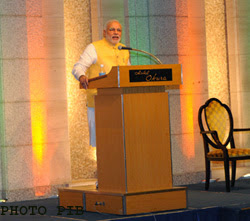Tokyo: The Prime Minister, Shri Narendra Modi, has said that commitment to peace and non-violence is ingrained in the DNA of the Indian society. He was responding to questions from students after delivering a special lecture at the University of the Sacred Heart in Tokyo. In reply to a question on how India could enhance the confidence of the international community as a non-NPT state, the Prime Minister said this commitment to peace that was intrinsic to Indian society, has significance far above any international treaties or processes.
He further said that India is the land of Lord Buddha, who lived for peace, and spread the message of peace across the world, he said, adding that India had won its freedom through non-violent means. For thousands of years, India has believed in the principle of Vasudhaiva Kutumbakam – the whole world is our family, Shri Narendra Modi said. When we consider the whole world as our family, how can we even think of doing anything that would harm or hurt anyone, he said.
In response to another question, the Prime Minister called for India and Japan to focus on shared values of democracy, development, and peace, saying this effort would be similar to lighting a lamp in the dark. Illustrating his point, the Prime Minister said an intelligent person would fight darkness in a room not with a broom, sword or blanket, but with a small diya (earthen lamp). “If we light a lamp, we need not be scared of darkness,” the Prime Minister said.
Replying to a question on environment, the Prime Minister said India had, for centuries, a tradition of dialogue (sanvaad) with nature. People in India think of the whole universe as their family, the Prime Minister said, saying that children call the moon their uncle, and rivers are addressed as “Mother.” He asked the assembled students if they felt “climate change” was a correct terminology. He said that human beings had actually changed their “habits” leading to strife with nature. This strife with nature had caused problems, the Prime Minister said. He referred to a book - “Convenient Action” - that he had written on the subject, and invited students to read it online, if they were interested.


Post a Comment